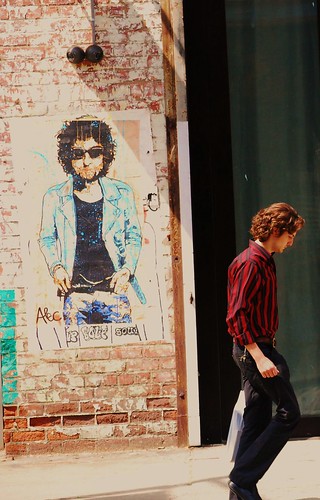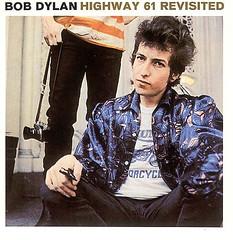Today we begin a recurring series of interviews with local experts who will offer their takes on cultural issues, trivia questions and current events concerning the neighborhood.
On Tuesday, American songwriting legend Bob Dylan celebrated his 70th birthday.
In a career that’s spanned 40 years and has had more than its share of mystery, one of the most enduring questions concerns Dylan’s disposition toward the Village and the meaning of the song, “Positively 4th Street.”
Some say the song was meant as a rebuke of all the plastic folkies Dylan met while living in the Village, while others claim it was Dylan’s way reacting to being booed, after leaving his fan-base to go electric at the Newport Folk Festival in 1965, and still others say Dylan was merely talking about the “many 4th streets of his life.” In any case, the song provoked a widespread feeling of individual unease by directing it’s accusations toward a universal “you:”
“You got a lotta nerve
To say you are my friend
When I was down
You just stood there grinning”
The Local East Village contacted Jeff Conklin, co-content Director for East Village Radio to provide his take on the song and Dylan’s relationship to the East Village.
What’s your interpretation of the song “Positively 4th Street?”
Quite simply jealousy. The song reminds me of a bucket full of crabs, where one crab is inching to get out and all the other crabs are trying to pull him back down. That’s my example of what happened to Dylan, anyway.
“You got a lotta nerve
To say you got a helping hand to lend
You just want to be on
The side that’s winning.”
He had to be angry when he wrote it. It’s a great song.
In a February 1966 interview with Playboy, Dylan has this to say about his performance at his debut electric performance at the Newport Folk Festival in 1965: “There were a lot of people there who were very pleased that I got booed. I saw them afterward. I do resent somewhat, though, that everybody that booed said they did it because they were old fans.” Do you think that “Positively 4th Street” came about as a reaction to this resentment?
It’s very possible, Dylan wrote about what he saw. And I see how he could not have been affected by it. I don’t think he really cared that people were disappointed that he went electric. You can pick the lyrics of “Positively 4th Street” apart and probably apply them to many things that were going on around him in New York City at that time.
After the “Positively 4th Street” was released, Israel Young, the manager of Gerdes Folk City, where Dylan spent quite a bit of time during his early years in the Village, was asked whether the song had been about him. In response, he called Dylan bitter and said that he had taken from the Village, and then left without giving anything back. Would that be an accurate statement?
No, absolutely not. I mean he didn’t owe anybody anything. Basically to this day, we’re talking 46 years on from the time of that song, I still see kids playing guitar in the subway and on stoops and there are “open mics” everywhere. There is a legacy that was left and Dylan was important in making New York City a destination for singer-songwriters from all over the globe.
What do you think of Dylan’s reluctance to give a definitive interpretation of the meaning of “Positively 4th Street?
I think it is part of his genius and part of his writing. He wrote in this elliptical way where you could form your own stories from his songs. He gives you the puzzle and you put together the story. After the “folky phrase” he wrote these lyrics that could seem nonsensical, but once you spend time with them you realize there’s a story there, and it’s not about Bob Dylan. You don’t listen to a Dylan song to find out about Bob Dylan. He was writing what could ostensibly be called pop music at the time, but he took them to a whole new level. You had to work to understand a Dylan song. He left it for lesser artists to tell the simple story songs. Dylan doesn’t want to tell you what to think, he wants you to think.
Jeff Conklin is the host of “Just Music Show” airing at Sunday nights at 10 on East Village Radio. The station features a six-hour birthday tribute to the rambling troubadour.





